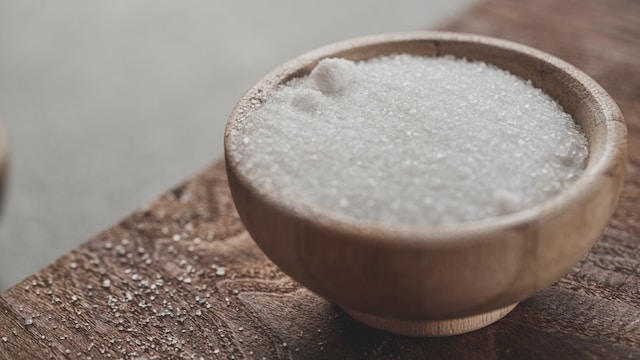世卫组织:人工甜味剂无助于减肥,长期摄入或增加健康风险 Artificial sweeteners not recommended for weight loss, says WHO
中国日报网 2023-05-22 17:24

有多少人对糖又爱又恨,希望有种神器能让自己尽享甜蜜的同时又不长肉。阿斯巴甜、三氯蔗糖等非糖甜味剂便成了众多甜食党减肥的“救命神器”。近日,世卫组织发布指南建议不要使用安赛蜜、阿斯巴甜、糖精等非糖甜味剂来控制体重。该组织称,这些非糖甜味剂的摄入会增加成年人患糖尿病,心血管疾病或死亡风险,并且对于减肥来说没有任何实质性的作用。

On Monday, the World Health Organization released new guidelines warning the public not to use non-sugar sweeteners for weight loss, revealing that it may actually do more harm to the body than good.
5月15日,世界卫生组织最新发布的一份指南提醒公众,不要借助非糖甜味剂减肥,这一表态意味着非糖甜味剂对身体健康或弊大于利。
New findings showed that artificial sweeteners — like aspartame, a sugar substitute found in Diet Coke — don’t do much to reduce your waistline. In fact, long-term use of these fake sugars could even potentially increase the risk for Type 2 diabetes, cardiovascular disease and mortality in adults, WHO said.
新的研究结果显示,添加在无糖可乐中的阿斯巴甜等人工甜味剂,对减肥没有任何效果。世卫组织称,长期使用非糖甜味剂可能增加成人患2型糖尿病、心血管疾病患病率和死亡的风险。
“Replacing free sugars with NSS (non-sugar sweeteners) does not help with weight control in the long term,” said Francesco Branca, WHO’s director of the department of nutrition for health and development, in a statement.
世卫组织营养促进健康和发展司司长弗朗切斯科·布兰卡说:“从长远来看,用非糖甜味剂代替游离糖无助于控制体重。”
According to WHO, some of the most common non-sugar sweeteners include “acesulfame K, aspartame, advantame, cyclamates, neotame, saccharin, sucralose, stevia and stevia derivatives.”
根据世卫组织,最常见的非糖甜味剂包括"安赛蜜、阿斯巴甜、安美、甜蜜素、纽甜、糖精、三氯蔗糖、甜菊和甜菊衍生物"。
Branca advised that people should instead try to focus on eating foods with natural sugar, like fruit.
布兰卡建议人们主要摄入水果等含天然糖分的食物。
“People need to consider other ways to reduce free sugars intake, such as consuming food with naturally occurring sugars, like fruit, or unsweetened food and beverage,” he continued. “NSS (non-sugar sweeteners) are not essential dietary factors and have no nutritional value. People should reduce the sweetness of the diet altogether, starting early in life, to improve their health.”
“人们需要考虑其他方法来减少游离糖的摄入量,例如食用含有天然糖分的食物,如水果,或不加糖的食物和饮料,”他继续说道。 “NSS(非糖甜味剂)不是必需的饮食因素,也没有营养价值。人们应该从生命的早期开始完全减少饮食中的甜味,以改善他们的健康。”
WHO noted that these new guidelines are applicable to everyone except for those who have preexisting diabetes.
世卫组织指出,该指南适用于除糖尿病患者以外的所有人。
The review was compiled through 283 studies, according to CNN, but some of them were observational, which means that they just show an association.
据CNN报道,这项审查是通过283项研究汇编而成的,但其中一些是观察性的,这意味着它们只是显示了一种关联。
The new guidelines include a wide array of non-sugar sweeteners, too — including ones that are naturally occurring.
新指南也包括范围广泛的非糖甜味剂——包括那些天然存在的甜味剂。
However, a statement put out by the Calorie Control Council, which is an “international association representing the low and reduced-calorie food and beverage industry,” maintained that these artificial sweeteners were still safe for consumption.
然而,卡路里控制委员会,即 "代表低卡路里和减卡路里食品和饮料行业的国际协会",发布的一份声明坚持认为这些人工甜味剂仍然可以安全食用。
“A substantial body of evidence shows that low- and no-calorie sweeteners provide effective and safe options to reduce sugar and calorie consumption,” said Robert Rankin, president of the Calorie Control Council. “This is supported by rigorous reviews of this evidence by the world’s most highly regarded health and regulatory agencies, who have validated the role of these ingredients.
"大量证据表明,低热量和无热量甜味剂为减少糖和热量消耗提供了有效和安全的选择,"热量控制委员会主席罗伯特·兰金说。"世界上最受重视的健康和监管机构对这一证据的严格审查支持了这一点,他们已经验证了这些成分的作用。
“Along with exercise and a healthy diet low- and no-calorie sweeteners are a critical tool that can help consumers manage body weight and reduce the risk of non-communicable diseases.”
"伴随着锻炼和健康饮食,低热量和无热量甜味剂是一个关键的工具,可以帮助消费者控制体重和减少非传染性疾病的风险"。
The International Sweeteners Association also pushed back on the new guidelines in an emailed statement to The Post.
国际甜味剂协会也在给《纽约邮报》的一份电子邮件声明中对新指南进行了反驳。
“There has been an overwhelming amount of scientific literature supporting low/no calorie sweeteners’ utility for weight management, including the WHO-commissioned systematic review itself,” the organization stated.
该组织表示:“有大量科学文献支持低热量/无热量甜味剂对体重管理的效用,包括世卫组织委托进行的系统审查本身。”
“The International Sweeteners Association believes it is a disservice to not recognize the public health benefits of low/no calorie sweeteners and is disappointed that the WHO’s conclusions are largely based on low certainty evidence from observational studies, which are at high risk of reverse causality.”
国际甜味剂协会认为,不承认低热量/无热量甜味剂对公共健康的益处是一种伤害,并对世卫组织的结论主要基于观察性研究的低确定性证据感到失望,这些研究极有可能出现反向因果关系。
WHO advised that the new recommendations encompassed “all synthetic and naturally occurring or modified non-nutritive sweeteners that are not classified as sugars found in manufactured foods and beverages, or sold on their own to be added to foods and beverages by consumers.” However, it does not apply to artificial sweeteners that are found in hygiene products, like toothpastes, skin creams or medications.
世卫组织表示,该建议中提到的“非糖甜味剂”包括了所有合成的、天然存在的或经过修饰的非营养性甜味剂,这些甜味剂不属于加工食品和饮料中的糖,也不属于消费者自行添加到食品和饮料的糖。但不适用于牙膏、护肤品、药物等含有非糖甜味剂的卫生产品。
It also does not apply to “low-calorie sugars and sugar alcohols (polyols),” which are technically sugars or sugar byproducts that do contain calories.
该建议也不适用于"低热量的糖和糖醇(多元醇)",从技术上讲,这些糖及其副产品确实含有热量。
This is not the first time that non-sugar sweeteners have been at the forefront of a health debate.
这不是非糖甜味剂的健康性第一次受到关注。
Last year, a study found that artificial sweeteners could potentially cause diabetes because they can “alter the body’s microbes,” resulting in a change in blood sugar levels.
2022年,一项研究发现人造甜味剂可能会导致糖尿病,因其可以“改变人体肠道微生物环境”,从而导致血糖水平发生变化。
“In subjects consuming the non-nutritive sweeteners, we could identify very distinct changes in the composition and function of gut microbes and the molecules they secret into peripheral blood,” Eran Elinav, senior author and professor at the National German Cancer Center, told South West News Service at the time.
“德国国家癌症中心高级研究院兼教授艾瑞·埃琳娜曾对英国西南新闻社表示:‘在食用非营养性甜味剂的受试者中,我们可以确定肠道微生物的组成和功能以及它们分泌到外周血中的分子发生了非常明显的变化。’”
Another study out of the Medical College of Wisconsin last April found that these sugar substitutes could potentially affect the liver’s ability to detoxify itself.
2022年4月威斯康星医学院的另一项研究发现,非糖甜味剂可能会影响肝脏解毒能力。
来源:纽约邮报
编辑:董静,李蕙帆(实习)

















 英语点津微信
英语点津微信 双语小程序
双语小程序